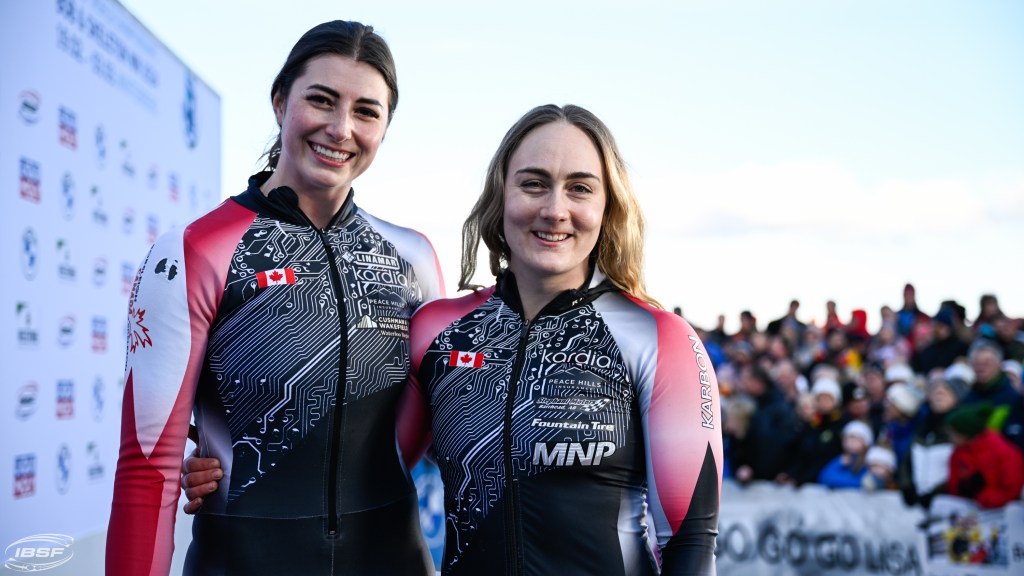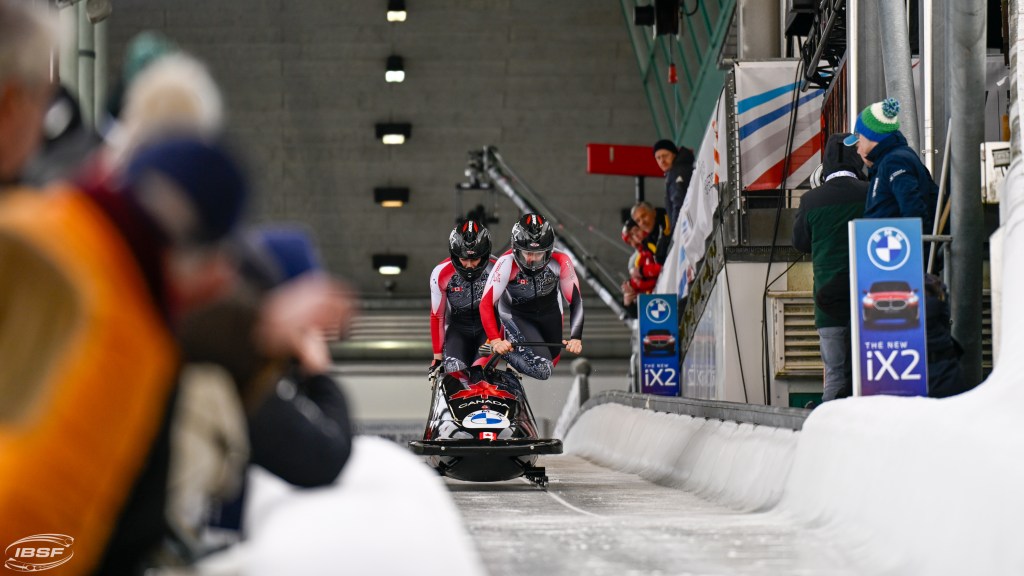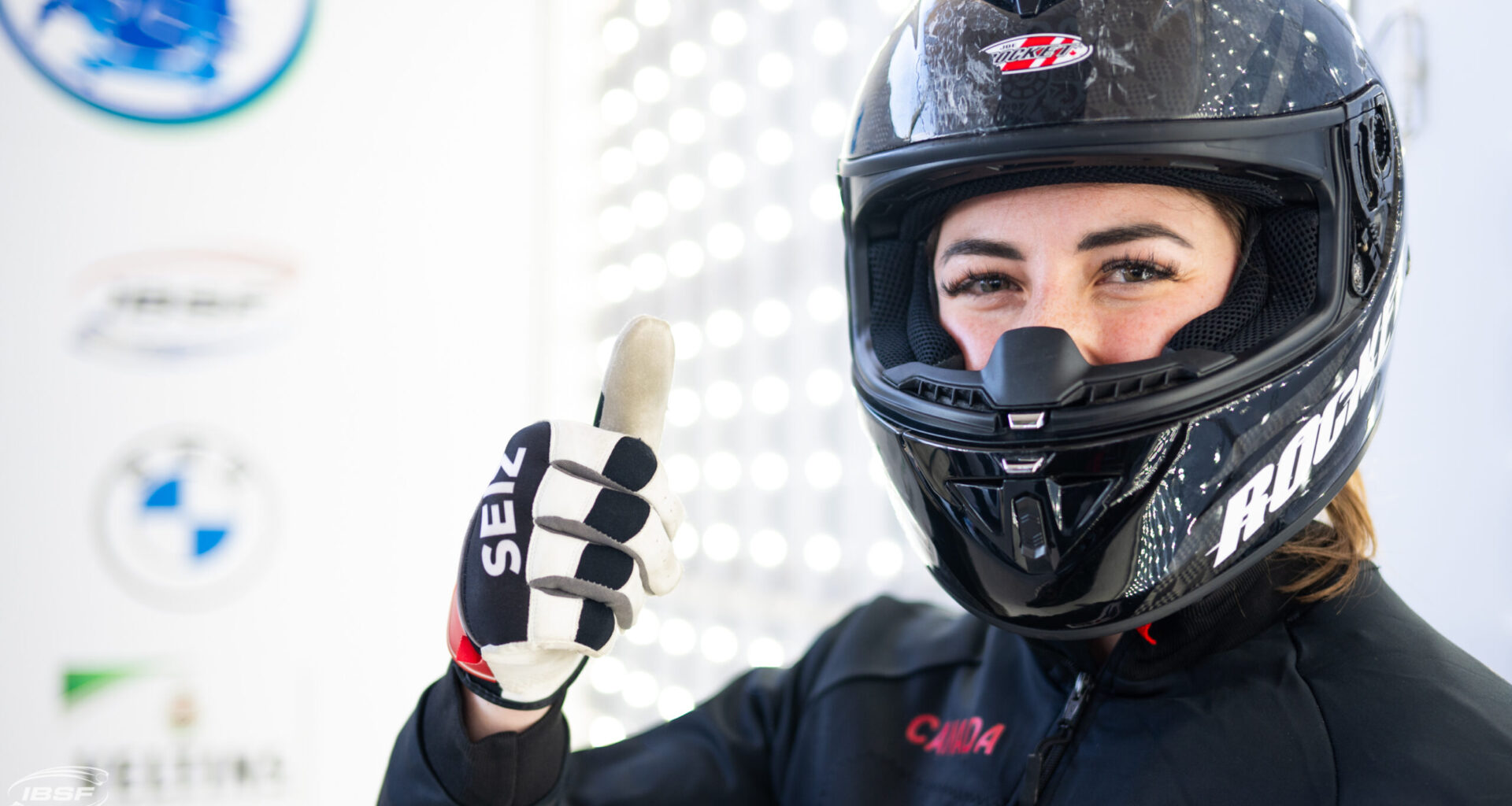“Exploring another country was kind of what … jump-started my yearning to just see the world and go with that as far as I can,” Klein told The IX Basketball.
However, just a few months into her season, Klein started feeling sick. Sensing it was serious, she returned home to Canada to get answers.
That set in motion a chain of events that led Klein to chase a berth in the 2026 Olympics as a bobsledder. She ultimately retired this summer for reasons outside of her control, ending a decorated athletic career that spanned multiple sports and continents.
“I’m … sad that we will not make a happy end [at the Olympics] and that it’s going on this way because she [gave] so much from her heart and from her life into this project,” Olaf Hampel, Klein’s personal bobsled coach, told The IX Basketball by phone from Germany. “… I know how hard she worked, and I know how close it was … to success.”
The IX Basketball, a 24/7/365 women’s basketball newsroom powered by The Next
The IX Basketball: A basketball newsroom brought to you by The IX Sports. 24/7/365 women’s basketball coverage, written, edited and photographed by our young, diverse staff and dedicated to breaking news, analysis, historical deep dives and projections about the game we love.
Growing up in Ontario, Canada, Klein was willing to try every athletic activity her mom suggested except for dance. She played four sports in high school, including badminton. At 6’1, she paired with a 6’7 boy in badminton to form, in her words, “the biggest team you could possibly imagine.”
But basketball was always her favorite, and she caught the eye of Bryant head coach Mary Burke because she blended physicality with a willingness to run the court as a forward.
“We’re very up-tempo, and … Alex would get out [and] run,” Burke told The IX Basketball about the system she ran until she retired in 2023. “Just her ability, her speed, was definitely something that I knew would be successful in our program.”
“From a rebounding perspective and getting in a spot to do all those things, she was kind of relentless,” Stu Julius, Klein’s basketball trainer dating back to high school, told The IX Basketball. “… She’s one of those players that a lot of teams hate [playing against], but a lot of teams want to have on their team.”
Klein chose Bryant in part because it was a smaller school with a good business program. It also helped that fellow Canadian Naana Ankoma-Mensa would be a senior when she arrived and would help her settle in.
Klein didn’t play a ton in her first two seasons, averaging just 5.7 minutes per game. But she started 24 of 31 games as a junior and averaged 8.8 points and 5.1 rebounds in 20.1 minutes per game.
In particular, Burke remembers a game at Fairleigh Dickinson shortly after Klein entered the starting lineup. Klein had 11 points on 5-for-10 shooting, eight rebounds, three blocks and two steals.
“She was out running the floor,” Burke said. “She was making all her layups around the basket. She understood, system-wise, what we were doing. And you saw when all the pieces came together, it was like, ‘Wow … if she continues to prosper in this direction, this is going to work out really well for her.’”
Klein took that next step as a senior, averaging a team-high 15.5 points and 7.8 rebounds in 31.9 minutes per game. She scored 20-plus points eight times and was named first-team All-NEC.
“I’m really, really proud of the first-team all-conference award my senior year, sticking to it and just never giving in,” Klein said. “… I worked really, really hard for that award. And it wasn’t … just being the talented person, but [being] the hardest-working person on the court and off the court.”
As Klein’s college career neared its end, she wasn’t sure what she wanted to do next. She didn’t even know whether she wanted to work in the United States or return to Canada. So when agents reached out to her about playing overseas, she was open-minded, which led her to Luxembourg’s second division.
Klein loved her teammates and the country of Luxembourg, and she contributed on the court, averaging 9.3 points and 4.3 rebounds in 23.6 minutes per game. She had her first double-double in just her second game with Etzella.
But soon she realized something was wrong. She was in pain and couldn’t eat, and she was getting weaker, which made it hard to keep playing. She didn’t know what was causing her symptoms, but her mom convinced her that leaving midseason was the best thing to do. She ended up playing 10 games overseas before returning to Canada.
Eight months later, Klein finally got a diagnosis: ulcerative colitis. It’s an autoimmune condition in which sores develop in the large intestine. That can severely disrupt eating and digestion, sometimes leading to malnutrition, and can also cause fatigue.
Want even more women’s sports in your inbox?
Subscribe now to The IX Sports and receive our daily women’s sports newsletter covering soccer, tennis, basketball, golf, hockey and gymnastics from our incredible team of writers. That includes Basketball Wednesday from founder and editor Howard Megdal.
Readers of The IX Basketball now save 50% on their subscription to The IX.
Basketball wasn’t on Klein’s mind as she sought a diagnosis; she just wanted answers. Once her ulcerative colitis was in remission, she got back in the gym — not to return to the sport, but to rebuild her strength and take care of her body. She soon started working sales and marketing jobs, and she also picked up a part-time job at a women’s kickboxing studio to connect with others and learn more about fitness and wellness.
Coincidentally, one of the studio’s co-owners also worked as a physiotherapist for Team Canada. She suggested that Klein consider pursuing one of the sports she worked with: bobsled.
“My reaction was lighting up a little bit,” Klein said, “because … I could compete and be in sport again.”
At the same time, Klein knew she wasn’t mentally ready to pursue bobsled yet, which would involve attending a testing camp for athletes looking to transition into the sport. Instead, she hired a coach to train her in bobsled techniques while she kept working full-time.
 Canadian bobsledders Alex Klein (left) and Melissa Lotholz pose for a photo during the 2024 BMW IBSF World Championships in Winterberg, Germany. (Photo credit: Viesturs Lacis | IBSF)
Canadian bobsledders Alex Klein (left) and Melissa Lotholz pose for a photo during the 2024 BMW IBSF World Championships in Winterberg, Germany. (Photo credit: Viesturs Lacis | IBSF)
In fall 2022, Klein tried out at a camp and made it into Canada’s bobsled pipeline for the 2022-23 season.
“I’m not surprised,” Burke said. “I mean, just because I know her mentality and I know her work ethic. … I saw, through her four years, when Alex puts her mind to [something] … there’s going to be a growth.”
Julius also wasn’t surprised. But as someone who considers Klein “like a daughter,” he couldn’t help but worry when he turned on the TV to watch her first race.
“I was scared. Who does that?” he said with a laugh.
Klein made the World Cup circuit — the top level of international bobsled — as an alternate for Team Canada in her first season. The following season, Canada qualified one fewer sled for the World Cup circuit, so Klein and her pilot, Melissa Lotholz, dropped down to the North American Cup circuit.
They promptly won the North American Cup in March 2024.
“It’s really great to even be able to say you’re the best in North America at a brand-new sport you never even thought about existing,” Klein said. “That was … a really special feeling. … I would never have been able to think about achieving something like that when I got diagnosed back in 2018. If you would have told me that, I’d say you’re absolutely crazy to even suggest that.”
“She makes a big step in the unknown, in a new language and a new sport in a new country,” said Hampel, who became Klein’s personal coach in January 2024 and started training her in person the following summer. “… This is not normal. Only a few — I say, only one I know — did [these] big steps.”
Athletes often transition to bobsled from sports like track and field or football, which have some transferable skills. But transitioning from basketball to bobsled required retraining Klein in everything. To add power and explosiveness, she needed to lift heavy weights, which she hadn’t done at Bryant. And instead of focusing on her vertical leap and agility, she had to train her body to sprint in a straight line as fast as possible.
As the brakewoman in the two-woman bobsled event, Klein was responsible for getting the sled going as fast as possible over a distance of roughly 50 meters, depending on the track. That’s nearly the length of two basketball courts arranged end-to-end — much farther than she would ever run in a game without turning.
“Everything you know about basketball, bye. Out the door,” Klein said of her early bobsled training.
Though Klein’s height was advantageous in basketball, it was a mixed bag in bobsled. It helped because she could cover more ground with one step and, combined with enough strength, push the sled faster.
But it was also challenging because bobsled has weight limits, which are calculated using the total weight of the sled, all equipment, the pilot and the brakewoman. (Unlike wrestling or boxing, bobsled also enforces those limits between runs, so athletes can’t put weight back on before the race.) With these limits in place, Klein was too tall to pair easily with some of Canada’s pilots — and cutting weight not only jeopardized her explosiveness, but also risked complicating her ulcerative colitis.
 Canadian bobsledders Alex Klein and Melissa Lotholz race down the track at the start of a run during the 2024 BMW IBSF World Championships in Winterberg, Germany. (Photo credit: Viesturs Lacis | IBSF)
Canadian bobsledders Alex Klein and Melissa Lotholz race down the track at the start of a run during the 2024 BMW IBSF World Championships in Winterberg, Germany. (Photo credit: Viesturs Lacis | IBSF)
The stress of bobsled also made it difficult for Klein to manage her ulcerative colitis. In an April 2024 podcast appearance, she said a run in bobsled “feels like you’re put into a trash can and you’re just thrown down the stairs.”
Her ulcerative colitis flared up while she was training in 2023, but she was able to recover on her own. After that, she remained in remission until after she retired.
“I’d actually tell you it’s not a smart thing to have done,” she told The IX Basketball about pursuing bobsled after her diagnosis. “Bobsled is a very high-anxiety, very strenuous sport on your system, specifically your nervous system. So that’s not great for someone with autoimmune stuff.”
After the 2023-24 season, Klein switched countries to represent Romania. The change came largely because she could pair with a smaller pilot to try to make the 2026 Olympics and would therefore need to cut much less weight. Klein and her new pilot, Andreea Grecu, were on track to make the Olympics, Hampel said, but Grecu ended up retiring in July 2025.
Without Grecu, Klein didn’t have a lot of options. She couldn’t pair with every available pilot, and she couldn’t switch to piloting, either. Klein estimated that it takes an average of four to six years to become a good pilot because it requires so much technical knowledge and familiarity with each course.
“She gives so much from her heart and from her personality to do it and makes the big jumps,” Hampel said, referencing not only her improvement as an athlete but also her moving to new countries to train. “… And then it doesn’t work. So … it’s not fair.”
Order ‘Rare Gems’ and save 30%
Howard Megdal, founder and editor of The IX Basketball and The IX Sports, wrote this deeply reported book. “Rare Gems” follows four connected generations of women’s basketball pioneers, from Elvera “Peps” Neuman to Cheryl Reeve and from Lindsay Whalen to Sylvia Fowles and Paige Bueckers.
If you enjoy Megdal’s coverage of women’s basketball every Wednesday at The IX Sports, you will love “Rare Gems: How Four Generations of Women Paved the Way for the WNBA.” Click the link below to order and enter MEGDAL30 at checkout to save 30%!
So Klein retired and pivoted again. On Sept. 2, she launched Group of Grit, a place for women and girls who are battling autoimmune conditions or personal hardships to find community. It currently offers free worksheets to help with goal-setting and mental energy, as well as merchandise. Klein believes good resources existed before Group of Grit for people with chronic illnesses, but “everything has this, like, gray, dark raincoat over it. …
“There needs to be some kind of community or safe space and platform that elevates these girls to help them not feel they can’t be successful, they can’t live a normal life, and they are their diagnosis because they’re so much more than that.”
Or, as Klein wrote on her website: “Group of Grit was born to … remind you that you’re not weak for struggling. You’re strong for surviving.”
As Klein launches her business, she still gets pangs of grief when she thinks about her friends in the bobsled world preparing for the 2025-26 season and the Olympics. But she also feels equipped to handle the emotions of her athletic career ending suddenly because she’s been through it before with basketball.
“I’m still grieving it, and there are feelings of disappointment and heartbreak involved with that,” she said. “At the same time, I feel so much stronger. …
“I used to think that you could — I’m [a] type A personality — you [could] plan, ‘My life’s gonna do this, and I’m gonna do this, and then I’m gonna be great at this. I’m gonna go to the Olympics, and I’m gonna do this.’ And … I find when you put that energy out in the world, life is like, ‘We’re actually going to go [another] way.’ …
“It hurts. It does hurt the heart. At the same time, I know I’ll be fine.”

